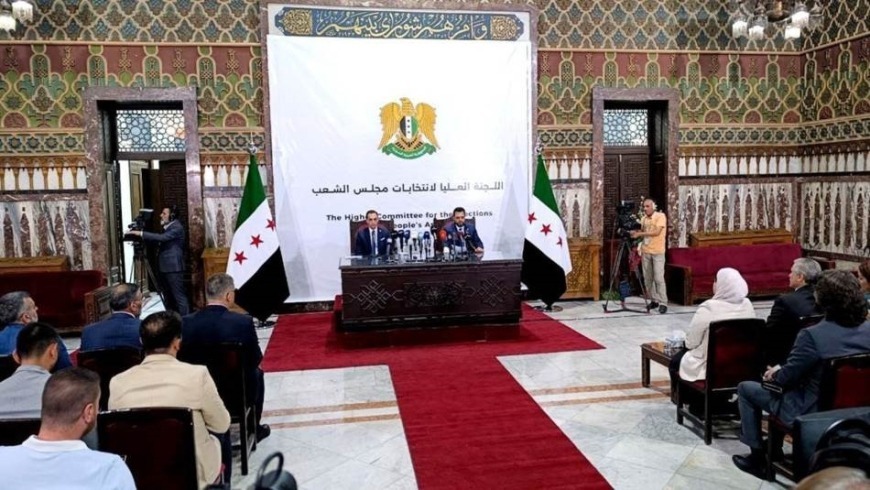As Syria navigates its transitional phase, the recent appointment of a Transitional People’s Assembly has been presented as a key step in the formation of nascent constitutional institutions. Advocates of the High Committee for Appointments have defended the move as a practical necessity, citing the current impossibility of holding general elections due to the absence of a political parties law, unresolved civil registry issues, the complexities of displacement and refugee return, the lack of an independent electoral commission, and the broader need for national deliberation on the electoral framework itself.
From this perspective, an appointed—albeit unelected—assembly is viewed as a temporary functional solution. The hope, proponents argue, is that the selection process will reflect standards of competence, diversity, and ethical integrity.
While this rationale may appear procedurally reasonable within Syria’s complex and fractured landscape, it cannot obscure the deeper political ramifications of forming a legislative body without electoral legitimacy—particularly with respect to the principles of power distribution, the separation of powers, and the legitimacy of representation.
Comparative experiences from Latin America’s so-called “banana republics” offer a cautionary lens. In many such cases, legislative bodies were designed not as instruments of popular sovereignty but as controlled entities engineered by ruling elites to manage dissent and project legitimacy. These assemblies functioned less as platforms for political accountability and more as mechanisms to entrench exceptional rule, substituting genuine oversight with symbolic endorsement.
A particularly troubling development came to light when Rayan Kahilan, a member of the Constitutional Declaration Drafting Committee, publicly stated that the transitional president is not subject to any oversight—neither by the People’s Assembly nor by any other institution—and that government ministers enjoy similar immunity. She invoked the “principle of separation of powers” as justification, arguing that oversight would undermine this separation. Yet this interpretation not only distorts the concept but empties it of substance. Separation of powers is not about institutional detachment, but about checks and balances—mutual constraints that prevent the consolidation of power in any single branch.
Granting blanket immunity to the executive while stripping the People’s Assembly of oversight tools reflects a deeply inverted understanding of modern governance. Rather than a legislative body, the Assembly risks becoming an extension of the executive—lending a veneer of legality to decisions lacking broad political or social grounding.
This is not merely a matter of timing or transitional expediency. It is a crisis of legitimacy. A legislative assembly is meant to serve as a cornerstone of political balance and public participation. Curtailing its powers or denying it the authority to question the executive, reject legislation, or ratify treaties undermines the constitutional contract upon which a post-authoritarian Syria should be built.
It is understandable that some view the appointment of an assembly as a necessary interim measure, given the institutional void and absence of electoral infrastructure. However, the core concern lies not in the act of appointment itself, but in the deliberate exclusion of real legislative authority. A People’s Assembly devoid of the means to hold power to account becomes, at best, a symbolic chamber—and at worst, a tool of authoritarian continuity.
This contradiction lies at the heart of the Constitutional Declaration. How can institutional balance be achieved if the executive stands above scrutiny while the legislature is subordinate by both design and function? If elections are not feasible, where are the foundations of political life? Where is the political parties law? Without pluralism, competition, and representation, the very essence of politics is absent.
Recent moves by the transitional authorities—particularly the hasty formation of a “General Secretariat for Political Affairs” to replace the dissolved Baath Party’s regional leadership—further deepen these concerns. Beyond procedural irregularities, the creation of this body suggests an intent to centralize political control through a new bureaucratic apparatus functioning as a de facto substitute party.
Structurally and ideologically, this body resembles not a pluralistic forum but a centralized “umbrella mechanism” designed to manage political life from above. It revives the top-down logic of single-party rule under a different name.
This raises a fundamental question in democratic theory: What are the minimum conditions for a genuine political transition? As Juan Linz and Alfred Stepan argued in their seminal work on democratization, without organized political pluralism, fair electoral laws, independent political institutions, and a free press, any transitional process remains at constant risk of regression into authoritarianism.
Appointing a People’s Assembly is not inherently problematic—but only if it is empowered to perform its constitutional duties. Without mechanisms of oversight, critique, and contestation, it becomes a passive instrument of executive will rather than an expression of popular sovereignty.
In the end, Syria’s transition will not be judged by the existence of new institutions alone, but by whether those institutions enable genuine accountability, inclusion, and democratic renewal—or merely reproduce the past under a new vocabulary.
This article was translated and edited by The Syrian Observer. The Syrian Observer has not verified the content of this story. Responsibility for the information and views set out in this article lies entirely with the author.


